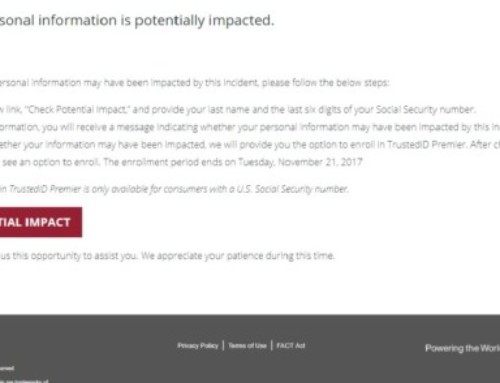If you are one of the millions of Americans who had private and sensitive data exposed by the Equifax data breach you should know about the California identity theft law. This is large scale invasion of privacy that could lead to severe financial implications for those affected. Fortunately, California has several consumer protection laws for victims of identity theft.
The Crime of Identity Theft
It is a crime to steal someone’s identity. The California Penal Code Section 530.5 says that a person is guilty of identity theft who “willfully obtains personal identifying information, as defined in subdivision (b) of Section 530.55, of another person, and uses that information for any unlawful purpose, including to obtain, or attempt to obtain, credit, goods, services, real property, or medical information without the consent of that person.” Identity theft is a crime – however there are additional consumer protections that the victim can actually pursue.
Civil Penalties for Identity Theft
California’s civil statutory framework for victims of identity theft (the California identity theft law) are contained in California’s Civil Code sections 1798.92 through 1798.97. According to California identity theft laws, you may sue a company for not providing a proper investigation after you have been a victim of identity theft. If your suit is successful, you may be entitled to $30,000.00 in statutory fees, actual damages, & attorneys’ fees. This article will explain if you are entitled to civil remuneration after being an identity theft victim.
Are you a Victim of Identity Theft?
The statute defines a victim of identity theft as follows: “(d) “Victim of identity theft” means a person who had his or her personal identifying information used without authorization by another to obtain credit, goods, services, money, or property, and did not use or possess the credit, goods, services, money, or property obtained by the identity theft, and filed a police report in this regard pursuant to Section 530.5 of the Penal Code.”
Private Cause of Action
The California identity theft law, specifically California Civil Code § 1798.93(c)(5), requires the victim of identity theft to provide the creditor with a written notice at least 30 calendar days before filing any complaint seeking their actual damages, attorney fees, and any other equitable relief as the Court deems appropriate.
The written notice places the creditor so notified, under a legal duty to take diligent steps to investigate the claim of identity theft. If they fail to do so, and the victim can show clear and convincing evidence that they failed to do so after being properly notified, the victim is entitled to a civil penalty of up to $30,000.00 in addition to any other damages pursuant to California Civil Code § 1798.93(c)(6).
Civil Code § 1798.93 provides the statutory authorization for the filing of a cross-complaint to establish that a person is a victim of identity theft in connection with the claim being asserted against them by any creditor, which shall be established by a preponderance of the evidence.
The California identity theft law is found in California Code, Civil Code – CIV § 1798.93 (6) A civil penalty, in addition to any other damages, of up to thirty thousand dollars ($30,000.00) if the victim establishes by clear and convincing evidence all of the following:
(A) That at least 30 days prior to filing an action or within the cross-complaint pursuant to this section, he or she provided written notice to the claimant at the address designated by the claimant for complaints related to credit reporting issues that a situation of identity theft might exist and explaining the basis for that belief.
(B) That the claimant failed to diligently investigate the victim’s notification of a possible identity theft.
(C) That the claimant continued to pursue its claim against the victim after the claimant was presented with facts that were later held to entitle the victim to a judgment pursuant to this section.
Damages for Failure to Reinvestigate
After alleging that you are a victim of identity theft, you may be entitled to actual damages, attorney’s fees, and costs, and any equitable relief that the court deems appropriate. Your legal representation may be paid by the company that has violated this law.
Statute of Limitations
You may bring a suit for identity theft within four years after reasonable discovery. California Code, Civil Code – CIV § 1798.96. There are certain rules and decisions that define “reasonable” discovery. While a reasonable time to discover an identity theft may buy you more time, it is important to address the situation in a timely fashion.
Protecting the Credit Report
There are certain ways you can monitor and protect your credit report. California Debt Harassment Attorney advises that you keep an eye on your credit report. The following video can give you some ideas on how to protect your report.
A credit bureau must enable a consumer to establish a “freeze,” prohibiting the credit bureau from giving report to anyone without the consumer’s consent. California Civil Code §§ 1785.11.2 (effective Jan. 1, 2003). Effective January 1, 2004, a credit reporting agency cannot charge more than $10.00 to place or remove the freeze, or $12.00 to temporarily lift the freeze. California Civil Code § 1785.11.2(m), SB 602.
Disputing Your Credit Report
If you would like to bring a claim against a creditor or a credit reporting bureau, you should dispute your credit report. If you would like to dispute your credit report, please see the following article for STEP by STEP instructions.
Further Research
The following sections cover California’s consumer protection framework:
http://codes.findlaw.com/ca/civil-code/civ-sect-1798-92.html
http://codes.findlaw.com/ca/civil-code/civ-sect-1798-93.html
http://codes.findlaw.com/ca/civil-code/civ-sect-1798-94.html
http://codes.findlaw.com/ca/civil-code/civ-sect-1798-95.html
http://codes.findlaw.com/ca/civil-code/civ-sect-1798-96.html
http://codes.findlaw.com/ca/civil-code/civ-sect-1798-97.html
Additional resources are available to you from the National Association of Consumer Advocates at the following LINK.
If you have been a victim of identity theft, please contact us on this website or call us at 858.869.9404 for a free consultation. We understand the California identity theft law and you may be entitled to a monetary award.







